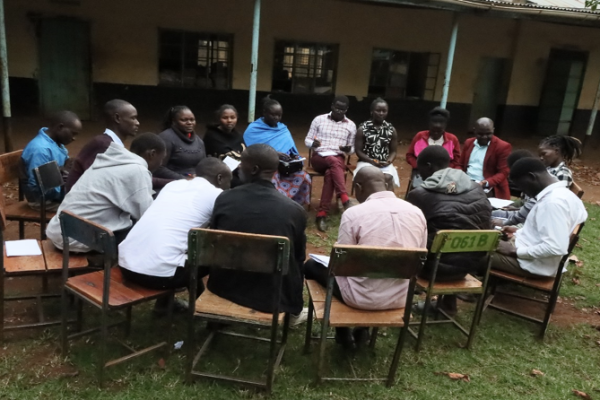By: Humphrey Agevi
Introduction
Africa disproportionately bears the brunt of climate change despite minimal responsibility. While the continent has the lowest global emissions per capita (under 4% of global CO2 emissions in 2020), its population has doubled from 509 million in 1990 to 1.11 billion in 2019, yet CO2 emissions per capita have barely increased. The negative effects of climate change, including water stress, reduced food production, increased frequency of extreme weather events, and lower economic growth, disproportionately affect vulnerable populations, fuelling mass migration and regional instability. This situation contributes to the continent experiencing the highest levels of poverty and inequality in the world, low levels of energy access, and low historical and per capita emissions, despite a growing population that is highly dependent on fossil fuel exports.
A staggering 43% of Africans lack electricity, and 970 million lack clean cooking fuel. The World Bank report of 2022, indicates Africa has the world’s lowest per capita energy consumption, relying heavily on unsustainable biomass (45%) and fossil fuels (52%). This lack of access hinders socio-economic development and climate goals. Over two-thirds (64%) of Africans primarily rely on firewood, agricultural waste, and animal dung for cooking. This dependence on traditional biomass fuels is highlighted by a 2022 report from the International Energy Agency (IEA). The report indicates a significant increase in Africa’s proven oil reserves, growing nearly 150% from 53.4 billion barrels in 1980 to 125 billion barrels by the end of 2017. Beyond oil, Africa boasts substantial energy resources, holding 13% of the world’s natural gas reserves and 7% of its oil. While Africa contributes 9.1% of global oil production, its consumption sits at a lower 4.2%. Similarly, Africa holds 7.5% of the world’s proven natural gas reserves, with production and consumption at 6% and 3.9% respectively.
The low energy use is attributed to insufficient power generation capacity, difficulties in managing energy infrastructure and attracting investments in the sector, and challenges in serving low-income users. Other challenges include poor technologies and capacity building, unsustainable renewable energy policies, poor financial support and high interest in credit facilities, unstable economies, and low levels of foreign investment. Sustainable energy sources are vital to achieving the continent’s socio-economic development goals and enabling it to address its own needs while also contributing to global climate goals by avoiding future emissions. The global shift towards a sustainable energy system has gained momentum due to the decreasing costs of renewable energy and the shared commitment to achieving a net-zero future for our society and humanity. This drive aligns with Sustainable Development Goal (SDG) 7, emphasizing universal access to affordable, reliable, and clean energy for all by 2030. Further, the Paris Agreement, with its objective of restricting the global average temperature increase to well below 2 degrees Celsius above pre-industrial levels, and an even more ambitious target of 1.5 degrees Celsius, propels the shift toward sustainable energy practices. The transition to a climate-resilient, net-zero economy is a global opportunity to deliver inclusive development in the 21st century. It offers the potential for tackling poverty and inequality and ensuring the protection of and respect for human rights.
Financing for Just Transition
IPCC report (2022) emphasizes climate finance as crucial for a successful global low-carbon transition, particularly for addressing Africa’s energy needs. However, achieving Africa’s energy and climate goals requires more than doubling current energy investments within this decade.
The continent has seen a meagre USD 55 billion in renewable energy investment between 2010 and 2020, representing a mere 2.4% of the global total (USD 2.25 trillion) during that period. Sub-Saharan Africa’s situation is even more concerning, with its share of renewable energy investment dropping from 1.5% between 2010-2020 to a worrying USD 3.6 billion in 2022, down from USD 5.3 billion in 2019.
Estimates suggest Africa needs over USD 190 billion annually from 2026 to 2030 to achieve its goals, with two-thirds allocated to clean energy. COP 27 further highlighted the urgency, revealing adaptation financing needs in Africa ranging from USD 259 to 407 billion between 2020 and 2030, with the energy sector alone requiring USD 4.5 to 7 billion. The current level of adaptation implementation falls short, leaving African countries vulnerable to the projected climate change risks. This is further compounded by the fact that adaptation expenditures already consume a significant portion (around 10%) of African countries’ GDP.
Why Data Availability is Critical for Guiding Just Transition Planning and Implementation
- Evidence-Based Policymaking: Reliable and robust data is indispensable for developing well-informed policies and programs. This allows African countries to address the socioeconomic and environmental challenges associated with the energy transition. With accurate data, countries can factor in correct estimates while revising their Nationally Determined Contributions (NDCs) and National Adaptation Plans (NAPs). Furthermore, robust data empowers policymakers to establish a clear framework for a just energy transition, prioritizing investments in renewable energy that promote local participation and ownership of distributed renewable energy initiatives.
- Targeted Interventions: When countries have a well-established system for collecting comprehensive data on the impacts of the energy transition, such as job losses, changes in household income, and the emergence of new economic opportunities, it enables them to design targeted interventions and support measures. This ensures efforts to mitigate any adverse effects and achieve a just and equitable transition are focused on the most impacted areas and communities. Resources and support can then be directed effectively towards those who need them the most.
- Robust Monitoring and Evaluation and Learning System: African countries require an effective monitoring and evaluation system. This system should include indicators and metrics developed collaboratively with communities during engagement processes. These metrics will be used to measure and track the progress and impact of the energy transition. Additionally, the system should incorporate mechanisms to identify and respond to any issues that arise, ultimately enhancing the effectiveness of the just transition approach.
- Stakeholder Engagement and Transparency: Stakeholders play a vital role in influencing the planning and implementation of just energy transition strategies. Transparent access to data and information is crucial for their effective participation. This participatory approach helps ensure that the concerns and priorities of diverse stakeholders are adequately reflected in policy and financing
- Financing a just energy transition towards a low-carbon economy in Africa requires substantial financial resources from donor countries and partners. Multilateral and bilateral climate finance institutions often necessitate robust data and monitoring mechanisms to assess the eligibility and impact of proposed projects or programs that aim to address the energy crisis or enhance just transition actions in the energy sector. Comprehensive data strengthens applications for accessing climate finance and development assistance, which are crucial for supporting the implementation of just transition initiatives in East Africa.
- Ensures value for money (Vfm): Data is critical during audits for renewable energy contract negotiations and agreements. This ensures these agreements are in the best interests of both the state and the communities directly impacted. Data availability guarantees equal and comprehensive stakeholder participation in all stages of renewable energy development projects, protecting the rights of communities potentially affected by these developments.
Conclusion
By prioritizing robust data collection, analysis, and utilization, African governments can unlock the full potential of a just transition. This data will empower not only informed policymaking and resource allocation but also ensure transparency, stakeholder engagement, and ultimately, a more equitable and prosperous future for all Africans. With readily available data as the cornerstone, Africa can navigate the complexities of the energy transition and emerge as a global leader in sustainable development.
©ARIN Press


